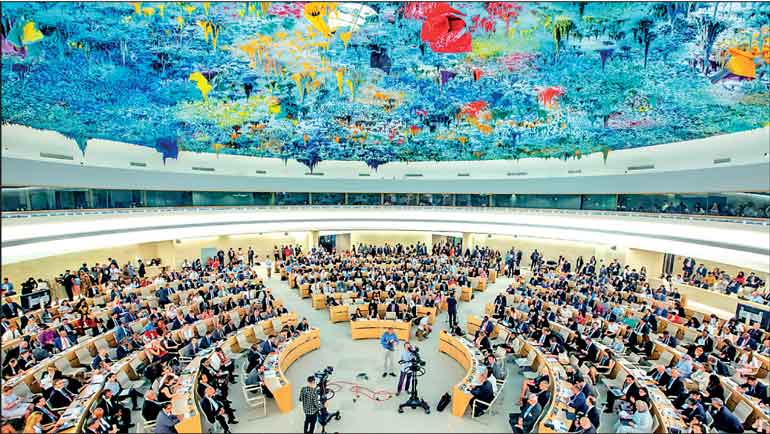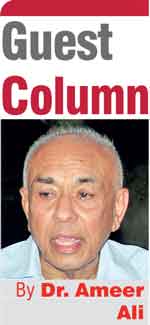Friday Feb 20, 2026
Friday Feb 20, 2026
Saturday, 24 September 2022 01:18 - - {{hitsCtrl.values.hits}}

If status quo continues after Geneva, the next phase of Aragalaya is destined to have world opinion on its side
 The 51st session of UNHRC in Geneva that began on 12 September and is scheduled to end on 7 October, was presented with the report on Sri Lanka by the outgoing High Commissioner of Human Rights, Michelle Bachelet.
The 51st session of UNHRC in Geneva that began on 12 September and is scheduled to end on 7 October, was presented with the report on Sri Lanka by the outgoing High Commissioner of Human Rights, Michelle Bachelet.
In concluding the report, she stated, “The broad-based demands by Sri Lankans from all communities for accountability and democratic reforms present an important starting point for a new and common vision for the future. The High Commissioner believes there is the opportunity for a new meaningful dialogue on how Sri Lanka can be transformed into an inclusive, pluralist and fully democratic state based on accountability, the rule of law, non-discrimination and respect for human rights in which an environment for freedom of expression, peaceful assembly and democratic participation will be essential.”
Don’t these concluding sentiments of the High Commissioner echo the essence of what the Aragalaya youths demand for systemic change? To that extent and in reaching the inner sanctum of a world body the youth has won part of their battle. Congratulations!
President Ranil Wickremesinghe (RW) in arresting Aragalaya leaders by invoking the dreaded PTA had provided an additional ammunition to the anti-regime groups gathered in Geneva.
In the meantime, the world listened to two presentations on Sri Lanka among several. One, by Foreign Minister Ali Sabri (AS) and the other, from a former Jordanian public servant and a woman of outstanding calibre who was appointed in 2020 as the Deputy High Commissioner for Human Rights, Nada Al-Nashif. Coincidently, both of them are Muslims.
Unlike the minister, an Attorney-at-Law turned politician who entered the Parliament unelected and on the invitation of his friend and client, the ousted president Gotabaya Rajapaksa (GR), the Acting High Commissioner is a qualified social scientist with a master degree from Harvard University’s John F. Kennedy School of Government and a progressive thinker and activist. More than her academic credentials, she had personally experienced the horror of terrorist violence when she was injured in 2003, when a suicide-truck exploded its deadly cargo and destroyed Baghdad’s Canal Hotel, killing 22 lives and injuring another 100 including the human rights lawyer Amin Mekki Medani.
In addition, she comes from that part of the world where kingly dictators, sultans and sheiks run amok with peoples’ human rights and get away from their crimes through the power and influence of their unearned wealth. Al-Nashif, is one of those outstanding Muslim women and a human rights activist who is making her mark in a male dominated world of Islam.
While minister Sabri was parroting the usual assurances of “advancing, securing and protecting the human rights of our people”, and refusing to allow any international mechanism set up to collect evidence and monitor Sri Lanka’s performance, the Deputy Commissioner was reminding him of the “use of the Prevention of Terrorism Act to arrest three student leaders on 18 August 2022, despite the government announcement on June 2022 that it has been applying a de facto moratorium on the use of the Act since March of this year”. Sabri’s empty assurances were confronting Al-Nashif’s hard facts. She was warning RW’s presidency not to commit the same crime as his predecessor by resorting to that draconian PTA and suppress peaceful protests. It was a dressing down of a country whose economy is gasping for survival.
Even before RW, when GR was at the helm and AS his Minister of Justice, didn’t that President, with a feeling of retribution, trample on the human rights of the minster’s own community when an order was made through gazette notification to cremate COVID-dead Muslim bodies? It is one thing to admit with fortitude past lapses in administering justice and then argue with determination to close that loophole in the future. That would have won the applause of at least a majority of Geneva attendees. But it is totally a different thing and blatant hypocrisy, tantamount to an exhibition of servility on the part of the Muslim minister to argue as nothing ever happened. In actual fact, he was only trying to save his former master and the current regime, which is headed by that master’s nominee RW.
Accountability for past crimes, and justice to all irrespective of one’s status, rank and wealth are the crying needs of the country today. That was embedded in Aragalaya’s call for systemic change and is being echoed in Geneva. With regard to justice, Minister AS may well be reminded of the popular concept of “circle of justice”, which was widely in vogue in pre-modern states of the Ottoman Empire, and received its poetic version from the writings of the Ottoman writer Kinalizade of 16th century. It is worth quoting one version of it:
“The world is a garden, hedged in by sovereignty
Sovereignty is lordship, preserved by law
Law is administration, governed by king
The king is shepherd, supported by the army
The army are soldiers, fed by money
Money is revenue, gathered by the people
The people are servants, subjected by justice
Justice is happiness, the well-being of the world.”
It is justice in every sector of governance, including economic welfare and distribution, that the people of Sri Lanka are demanding from their leaders. They had been denied of it, and they feel that they had been cheated and thrown into abject poverty, because of their leaders’ uncontrolled avarice, corruption, authoritarianism and injustice. RW’s presidency is proving to be a replica of GR’s presidency with all its authoritarian trappings, but with an IMF designed economic program, which is also not going to make life comfortable at least for the next two years. In addition to hardship imposed by IMF strictures there would be additional ones flowing from a world economy struggling with supply shortages and inflation.
Given this context, the presentation by AS and his entourage in Geneva lacks substance and is no more than an attempt to extricate the Rajapaksa regime and its current guardian RW from worldwide condemnation. But the world cannot be fooled any more. The diasporic communities are well equipped with hard facts and they are working behind the scene to effect a change in their homeland. If status quo continues after Geneva, the next phase of Aragalaya is destined to have world opinion on its side.
(The writer is attached to Murdoch Business School, Murdoch University, Western Australia.)